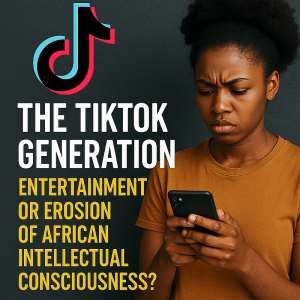
In today’s fast-paced digital world, a new generation has emerged raised not on books and blackboards, but on short-form videos, viral dances, and bite-sized comedy skits. For many African youth, TikTok and similar platforms have become not just sources of entertainment but instruments of identity and escape. But beneath the surface of laughter and likes lies a deeper question: Is this wave of content consumption a harmless distraction, or is it quietly eroding the intellectual consciousness of Africa’s future leaders?
TikTok, like other social media platforms, is a double-edged sword. It democratizes expression, giving voice to the voiceless and empowering creativity even in the most remote corners of the continent. A young girl in Jos can go viral in South Africa. A skit maker in Accra can gain followers in Canada. This borderless digital space has, in many ways, flattened the world and opened doors previously closed to African youth.
But what are we doing with this access? Far too often, it appears we are choosing fleeting entertainment over enduring enlightenment. Instead of using these platforms to promote knowledge, history, culture, or innovation, we are trapped in a cycle of mimicry, vanity, and mindless trends. What began as a tool is quickly becoming a trap.
It is no coincidence that reading culture is on the decline, intellectual debates are scarce, and youth interest in history, philosophy, and nation-building is waning. Many teenagers today can name ten influencers but not ten African leaders or authors. They know the latest TikTok sound, but not a single quote from Chinua Achebe, Ngũgĩ wa Thiong’o, or Wole Soyinka. We are witnessing the gradual dissolution of critical thinking replaced by instant gratification, aesthetic obsession, and algorithm-driven distractions.
This is not to romanticize the past. Every generation has had its escape radio dramas, soap operas, or music videos. But what makes the TikTok era uniquely dangerous is its scale, speed, and subtlety. The app’s design is built for addiction. Its short format discourages deep thought. Its content is rarely curated for learning. And with millions glued to their screens for hours daily, the opportunity cost is immense.
The erosion of intellectual consciousness is not just about academic performance. It’s about our capacity to reflect, to question, to build, and to lead. When youth spend more time rehearsing choreography than rehearsing solutions to their community’s challenges, we must ask: What kind of future are we cultivating?
Yet, all is not lost. The same technology that distracts can be redirected to educate, mobilize, and awaken. Imagine if African creators used TikTok to explain history, teach science, explore philosophy, promote indigenous languages, or showcase innovation. Imagine if “going viral” meant spreading truth, not trivia. The potential is immense if only we reclaim it.
Parents, educators, religious leaders, and influencers must all play a role. We must guide young people to balance leisure with learning, to consume content with intention, and to question what they watch. Governments and policymakers must also take digital literacy seriously not by banning platforms, but by fostering responsible digital citizenship.
Africa’s future will not be built on filters and hashtags. It will be built on ideas, courage, and critical thinking. must realize that they are not just consumers they are creators of tomorrow’s reality. The continent is at a crossroads, and our screens may determine the path we take.
The question remains: Are we entertaining ourselves into oblivion, or will we awaken in time to reclaim our minds?


